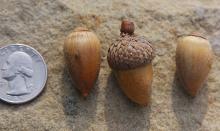Quercus engelmannii
Common name:
Engelmann Oak
Mesa Oak
Pronunciation:
kwer-KUS en-gel-MAN-e-i
Family:
Fagaceae
Genus:
Type:
Broadleaf
Native to (or naturalized in) Oregon:
No
- Broadleaf evergreen tree, drought-deciduous, erect, to about 15-50 ft ( m), short trunk, spreading branches, in the open, a rounded crown and foliage reaching the ground. Leaves alternate, simple, leathery, stiff, 2.5-7 cm long, oblong to obovate, tip and base rounded, margin entire, wavy or toothed, blue- or gray-green above, the lower surface is pale, bluish green, hairy when young, glabrous (without hairs) later; petiole 3-7 mm long. Flowers, male (staminate) in slender hairy catkins 5-5.7 cm long; female (pistilate) on slender stalks. Fruit (acorn) matures in 1 year, cup 6-8 mm long, nut 15-25 mm long, oblong-cylindric to ovoid, tip rounded to obtuse, shell glabrous inside.
- Sun. Deep watering once a month during the dry season
- Hardy to USDA Zone 8 Limited distribution, native to extreme southwestern California and northern Baja California.
- engelmannii: after George (Georg) Engelmann(1809-1884), German born, both a prominent physician and botanist of St. Louis. One of the original members of the National Academy of Sciences.







